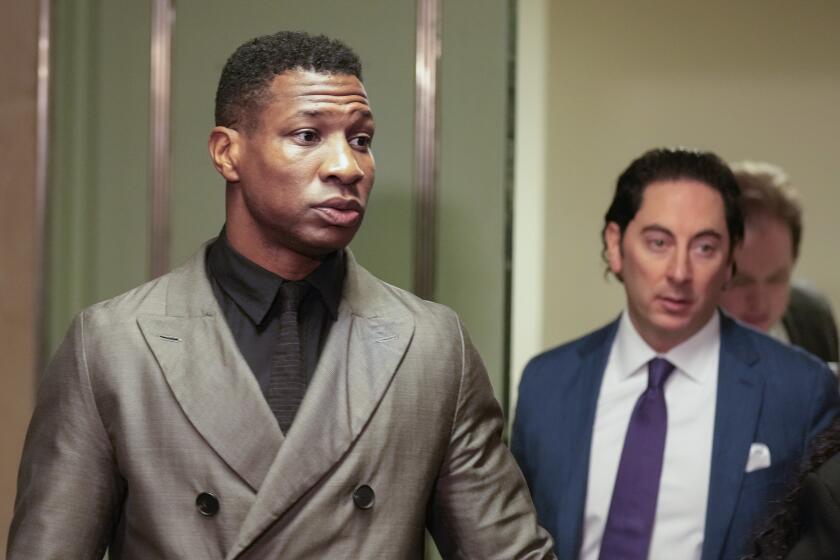‘Smile!’ How a villain’s phrase in ‘Jessica Jones’ exposes modern-day sexism
Just 30 minutes into the series premiere of “Jessica Jones,” the title character, in flashback, is shown at a table in a high-end restaurant. It’s a version of Jones we’ve never seen before, polished and pristine, an evening gown replacing her traditional jeans. But the most significant change in our heroine’s appearance is the complete lack of fire in her eyes.
“To our anniversary,” Jones’ companion utters as their food arrives, “You’ll love it.”
“I will love it,” she parrots.
“Then smile.”
To our horror, Jones obliges, cracking what may be her first smile of the series, a toothy, empty grin that reminds audiences how narrow the distance is between a smile and a grimace and introduces us instantly to the most innocuous and incisive cultural critique that Marvel television has launched to date.
NEWSLETTER: Get the day’s top headlines >>
The instruction itself, as delivered to Jones, is sinister, not merely because of the overtones of abuse and manipulation, but because similar well-meaning scenarios play out in the real world time and again each day. What makes this situation special, however, is how it’s treated within the narrative of its source material.
The Netflix series follows failed superhero Jessica Jones, played by a steely Krysten Ritter, by now employed as a full-time private investigator, part-time alcoholic, and serves as a haunting flashback to a memory (and a man) Jones can’t seem to wrench herself free from.
The man in question is Kilgrave, shrewdly portrayed by David Tennant, whose powers of mind control are often used to nefarious ends. Kilgrave’s single-minded obsession with Jessica begins years before and only intensifies once she manages to break free from his grasp.
If the “Jessica Jones” series was the type of show to have a catchphrase line for each character, “Smile,” would be Kilgrave’s. The instructions to “smile” appear in both the “Alias” graphic novels, written by Brian Michael Bendis, as well as in the series that adapts them, but outside of that mainstay, the series often opts for a much lighter hand as far as the depiction of manipulation goes.
While Bendis’ version of the villain orders Jessica to strip (or dress in a schoolgirl ensemble while naked women writhe in the background), the TV version instructs her to smile. The seemingly less invasive direction is transformed into a nuanced example of everyday sexism, grounding the comic book fantasy into modern-day reality.
By insisting that Jessica smile, Kilgrave is aping an action so culturally prevalent that it’s spawned a campaign to end gendered street harassment called “Stop Telling Women to Smile,” as well as spurring dozens of Internet think pieces.
The message is coming through loud and clear to “Jessica Jones” audiences as well.
Telling a woman, particularly a stranger, to smile presumes unearned familiarity. Worse, it implies a right to dictate behavior. Perhaps, however, the most unnerving aspect is how frequently the endeavor is entered into with the best of intentions.
When asked specifically how much of the framing of “smile” is inspired by modern misogyny, show runner Melissa Rosenberg laughs before responding, “Let’s see. 100%” Rosenberg continues, “This is a character who is not defined by her gender. But those of us of the female persuasion, our lives are certainly informed by our gender and the misogyny around us.”
Moreover, Kilgrave’s powers bring matters of consent to the forefront, not merely by showing him taking over the minds of both men and women, young and old, but by digging into his confusion about his own abilities.
“I never know if someone is doing what they want or what I tell them to do,” Kilgrave cries to Jones, when confronted over the repeated incidents of rape and abuse. In attempting to justify his powers of persuasion, Kilgrave serves as an exaggerated representation of perceived consent.
The cluelessness that often underscores unintentional harassment does not seem to be lost on Rosenberg, as later episodes in the season will attest to. In the midst of a heated argument, Kilgrave attempts to explain away his treacherous actions. He even goes so far as to apologize for his sins, even as he doesn’t believe he’s truly guilty of them, saying, “Whatever you think I did to hurt you, I’m sorry.”
It’s telling that with all of the issues that “Jessica Jones” tackles, including PTSD, rape and abuse, it has chosen to make its arch villain something of a throwback to an antiquated misogyny in which he is pathologically unable to take responsibility for his actions.
When Kilgrave tells Jessica to smile, it’s disturbing not because he controls her every thought and action, but because it’s a situation that resonates with many women, sans superpowers.
“Jessica Jones” is revolutionary because in acknowledging casual misogyny and exaggerating its most destructive tendencies, it exposes the pervasive toxicity therein. It does all of this without making a show of its politics, instead resting easy on the knowledge that all too many women will relate to the subtleties of its premise.
ALSO:
‘Jessica Jones’ showrunner Melissa Rosenberg talks rape, adaptation, and female sexuality
David Tennant on Marvel’s ‘Jessica Jones’ and the pains of playing a purple psychopath
Krysten Ritter on playing anti-superhero, Jessica Jones
More to Read
The biggest entertainment stories
Get our big stories about Hollywood, film, television, music, arts, culture and more right in your inbox as soon as they publish.
You may occasionally receive promotional content from the Los Angeles Times.







